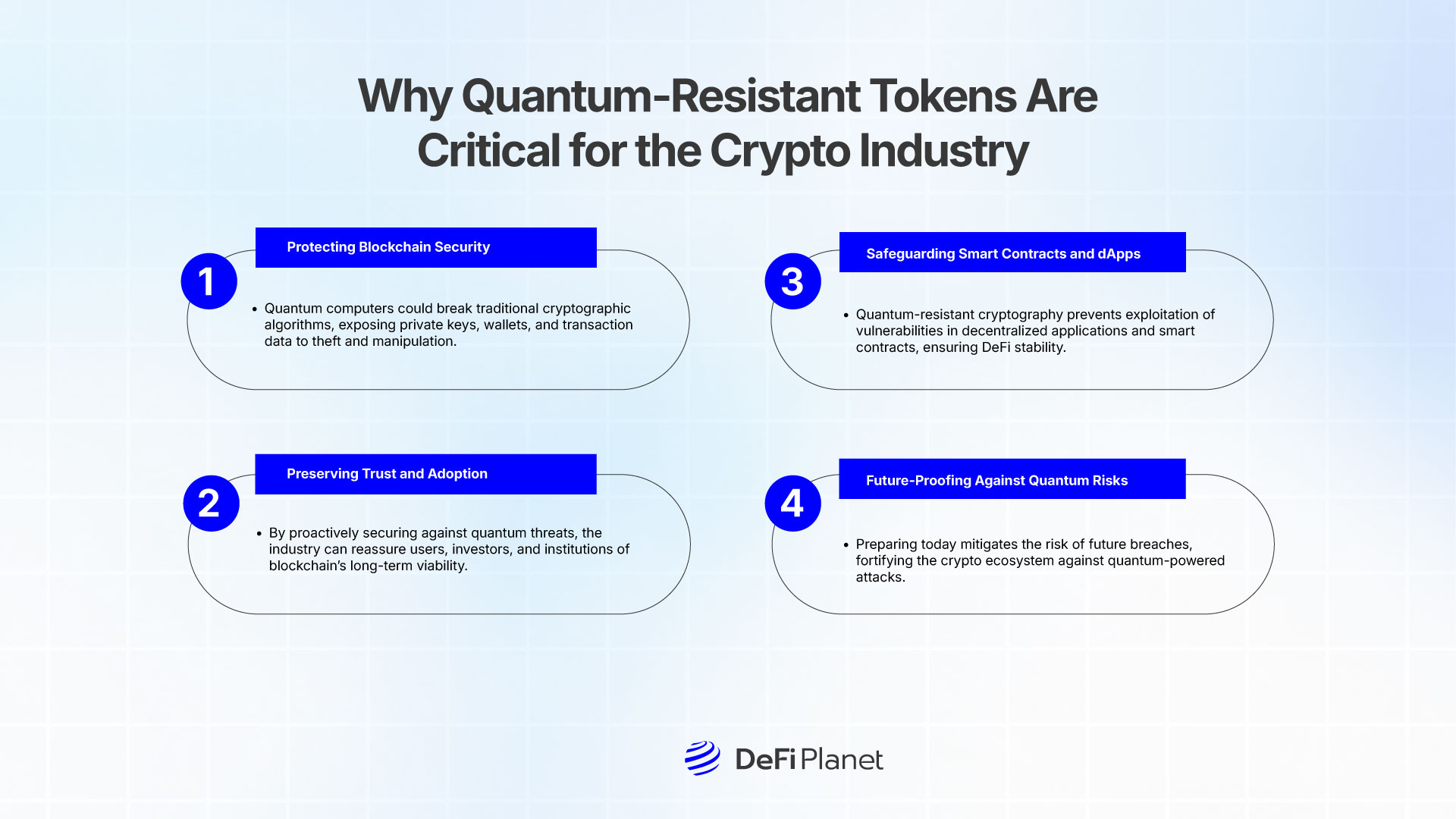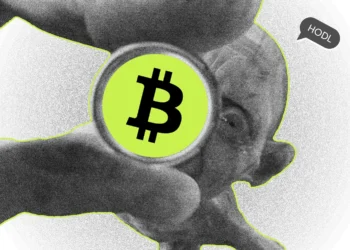Last updated on March 4th, 2025 at 08:23 am
Quantum computing is advancing quickly, and the latest developments suggest that practical applications capable of breaking today’s cryptographic systems may be closer than expected. Quantum-resistant tokens are the crypto industry’s response to these growing concerns about the potential impact of quantum computing on the security of blockchain networks.
With their immense computational power, quantum computers could potentially break the cryptographic algorithms underpinning cryptocurrencies like Bitcoin and Ethereum. This poses a significant threat to the encryption methods currently used in these networks.
Quantum-resistant tokens are designed to operate on algorithms that can secure data against both traditional and quantum computing threats. Several projects, such as Quantum Resistant Ledger (QRL) and IOTA, are already exploring quantum-resistant solutions, incorporating advanced cryptographic techniques like XMSS (Extended Merkle Signature Scheme) and Winternitz One-Time Signature (WOTS) to secure their networks. These initiatives are essential in preparing the crypto ecosystem for a future where quantum computing may pose a significant risk.
In this article, we explain what quantum-resistant tokens are, how they function, and why they are crucial for the future of blockchain technology and cryptocurrency security.
How Quantum-Resistant Tokens Work
Traditional cryptographic algorithms, such as Rivest-Shamir-Adleman (RSA) and Elliptic Curve Cryptography (ECC), are vulnerable to quantum computers because they can efficiently solve the problems underlying these encryption methods–within a short time.
Quantum-resistant tokens rely on post-quantum cryptography (PQC), a set of cryptographic methods specifically designed to take advantage of mathematical problems that quantum computers struggle to solve.
Some of the key cryptographic techniques used in PQC include:
- Lattice-Based Cryptography
- Hash-Based Signatures
- Code-Based Cryptography
- Multivariate Polynomial Cryptography
Both lattice-based and multivariate polynomial cryptography rely on complex mathematical problems; the former involves lattice structures, while the latter deals with complex, nonlinear equations with many variables. These cryptographic schemes are considered one of the most promising solutions in post-quantum cryptography due to their robustness against quantum threats. HyperCash (HC) is an example of cryptocurrency that uses lattice-based cryptography.
Code-based cryptography uses error-correcting codes to create cryptographic systems that are challenging for quantum computers to break, while hash-based cryptography uses hash functions, which convert data into a fixed-length string of characters, to generate digital signatures. These signatures are believed to be secure against quantum attacks because they don’t depend on number-theoretic assumptions like ECC or RSA.
The native token of Quantum Resistant Ledger (QRL) uses the XMSS, an example of a hash-based signature system. The IOTA project currently uses a non-quantum resistant system but is planning to do so in its next iterations. It aims to adopt WOTS, also a hash-based cryptographic scheme.
RELATED: Does Google’s Quantum Computing Chip Truly Threaten Bitcoin?
Why Do Quantum-Resistant Tokens Matter for Crypto?
Cryptocurrencies are built on trust, with users relying on strong encryption to protect their data, wallets, and transactions. Quantum computers could potentially exploit vulnerabilities in current cryptographic systems, leading to theft, loss of funds, and breaches of personal information.
Implementing quantum-resistant algorithms ensures that private keys, transaction records, and user identities remain secure, even against quantum-powered threats. By proactively addressing these risks, the crypto industry can prevent catastrophic breaches that could erode confidence in the technology.
They Are Crucial to Maintaining Trust and Stability Within the Crypto Ecosystem
The fear of quantum attacks could discourage adoption and hinder the development of blockchain technology. By transitioning to quantum-resistant cryptographic protocols, the industry can reassure users, investors, and institutions of the long-term viability and safety of cryptocurrencies.
This proactive approach not only safeguards the ecosystem but also strengthens its foundation, ensuring stability as quantum technology continues to advance.

They Help Ensure that Blockchain Technology Remains Relevant
By addressing quantum challenges, the blockchain industry is setting new benchmarks for security and resilience, encouraging collaboration between cryptographers, developers, and institutions. This push for innovation strengthens the crypto ecosystem, paving the way for breakthroughs that can benefit areas like DeFi, Web3 applications, and beyond.
Ultimately, the development of quantum-resistant tokens not only future-proofs the industry but also unlocks new opportunities for growth and technological progress.
Challenges of Quantum-Resistant Tokens
While quantum-resistant tokens offer crucial protection against future quantum threats, their adoption comes with several challenges that need to be addressed.
Lack of Universal Standards
Currently, there isn’t one standard for quantum-resistant algorithms that everyone agrees on. Groups like the National Institute of Standards and Technology (NIST) are working on creating a universal standard, but until that’s done, different blockchain networks may choose different solutions.
This could cause problems because these platforms might not work well together, leading to confusion and fragmentation in the industry as everyone tries to get ready for the future of quantum computing.
Scalability and Performance Issues
A major challenge for quantum-resistant tokens is the performance cost associated with post-quantum cryptographic algorithms.. These algorithms, while highly secure, typically require more computational power and memory than traditional cryptographic methods. This can lead to slower transaction speeds and increased resource consumption, potentially impacting the efficiency of blockchain networks.
For example, larger key sizes and complex encryption processes may result in longer transaction times, which could deter users accustomed to the fast-paced nature of crypto transactions. Balancing security with scalability remains a critical challenge for developers working on quantum-resistant solutions.
Integration with Existing Systems
Retrofitting quantum-resistant algorithms into existing blockchain systems is a complex task. Most blockchains are built on cryptographic frameworks designed for classical security, making it challenging to integrate new quantum-resistant protocols without disrupting the network’s functionality.
Furthermore, transitioning to quantum-resistant systems may require extensive updates to wallets, smart contracts, and consensus mechanisms. Ensuring compatibility and smooth integration without compromising the existing blockchain infrastructure is a significant hurdle for developers and network operators.
Adoption Barriers
Despite the growing awareness of quantum threats, there is still limited adoption and understanding of quantum resistance within the crypto community. Many users and developers are unfamiliar with quantum-resistant technologies or underestimate the urgency of preparing for potential quantum attacks.
Additionally, the perceived complexity of quantum-resistance measures may discourage adoption among smaller projects or less tech-savvy stakeholders. Education and awareness campaigns are needed to bridge this gap and encourage widespread adoption.
Moreover, the rapid evolution of quantum computing poses a moving target for quantum-resistant algorithms, requiring ongoing updates and research. Ensuring compliance with future regulatory standards while keeping pace with quantum advancements adds an extra layer of complexity to the adoption process.
The Future Outlook for Quantum-Resistant Tokens
The future of blockchain will likely be defined by tokens designed to withstand quantum computing. In fact, we can argue that quantum-resistant tokens represent the next evolutionary step for cryptocurrency because the era of quantum computing will not just challenge blockchain—it will redefine it. Crypto projects will have no choice but to transition to creating tokens capable of existing in a quantum world.
The objectives of Ethereum’s “The Splurge” phase and Solana’s latest cryptographic upgrades reflect the industry’s proactive measures to prepare for this post-quantum world.
However, the question remains: are quantum-resistant tokens alone sufficient to ensure security in the quantum era? While these tokens address critical risks associated with quantum attacks on cryptographic algorithms, they cannot be the sole solution. Blockchain ecosystems are vast, encompassing wallets, smart contracts, consensus mechanisms, and off-chain interactions—all of which could become targets for quantum-enabled threats. Moreover, quantum technology could introduce risks beyond cryptography, such as the ability to bypass certain types of decentralized protocols or perform advanced data analysis on private transactions.
Despite these limitations, quantum-resistant tokens represent a vital step in the right direction. They lay the groundwork for a secure blockchain future and signal the industry’s commitment to addressing quantum challenges. However, a multi-pronged approach will be necessary to build true resilience. This includes innovations in hardware security, dynamic cryptographic techniques such as key rotations, and decentralized systems for monitoring and mitigating threats in real time.
By addressing quantum risks holistically, the blockchain sector can turn these challenges into opportunities for growth and innovation. Quantum-resistant tokens may not solve every problem, but they exemplify the forward-thinking mindset needed to ensure blockchain technology thrives in the face of quantum disruption.
Disclaimer: This article is intended solely for informational purposes and should not be considered trading or investment advice. Nothing herein should be construed as financial, legal, or tax advice. Trading or investing in cryptocurrencies carries a considerable risk of financial loss. Always conduct due diligence.
If you would like to read more articles like this, visit DeFi Planet and follow us on Twitter, LinkedIn, Facebook, Instagram, and CoinMarketCap Community.
Take control of your crypto portfolio with MARKETS PRO, DeFi Planet’s suite of analytics tools.”























